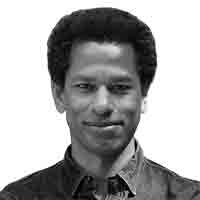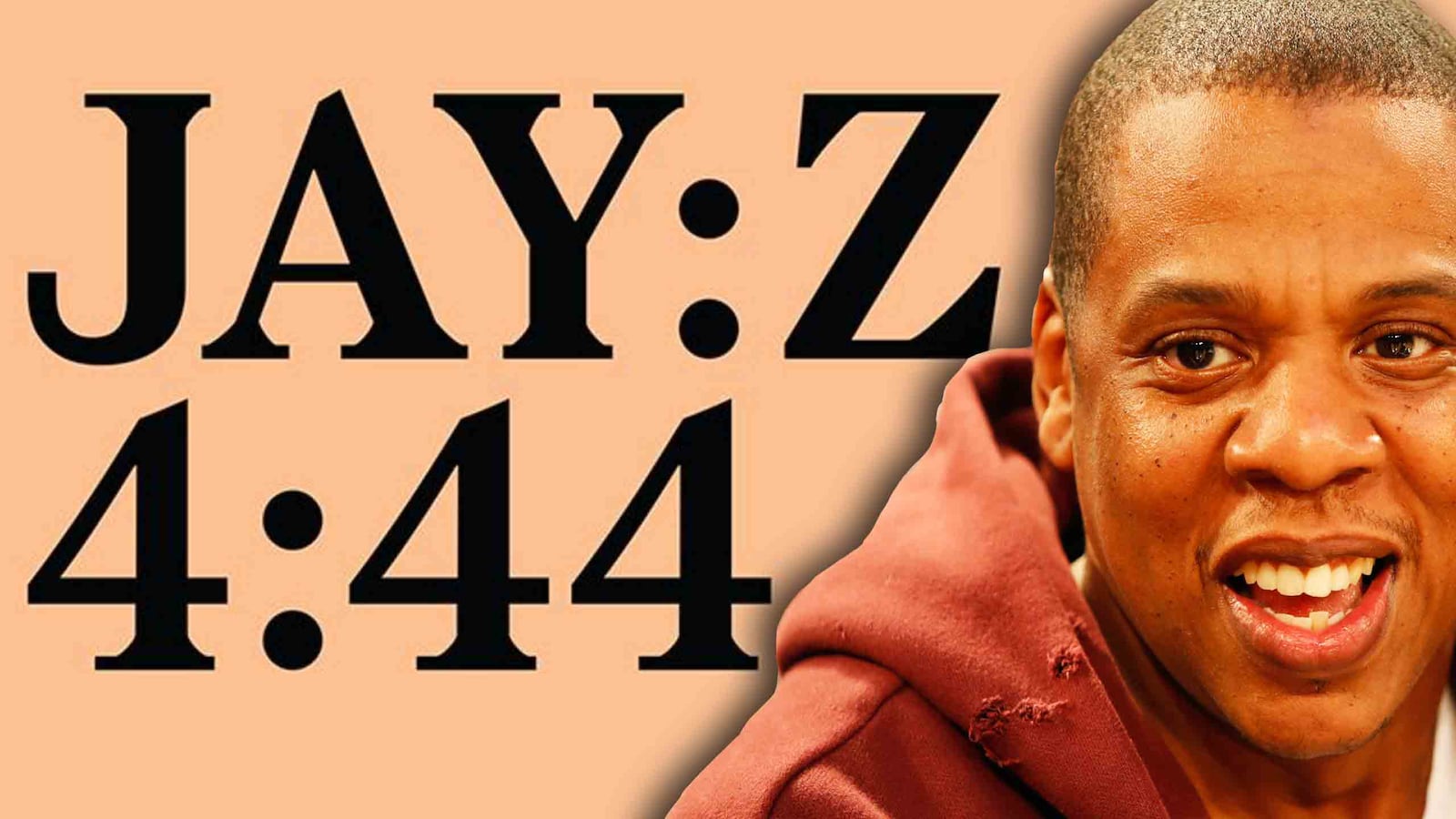What is mature hip-hop? What’s it sound like? For hip-hop to continue to thrive there must be a true adult wing for the grown folks who loved hip-hop in its early years but now have families and no time to go to the clubs and can’t rock with kids putting testosterone on wax or acting out their drug dealer dreams. Where’s the hip-hop that’s soulful, that’s honest and emotional, that talks about marriage and parenting in a real way and still has swag? One answer: JAY-Z’s 4:44. Easily one of Hov’s greatest albums.
This is mature hip-hop. The sound is soulful, with meaty chunks of Stevie Wonder, Nina Simone, and Sister Nancy. The vibe is personal and confessional: he’s a mature man, big enough to be humble, to be gentle, to reveal, to apologize. The mighty JAY-Z, baddest MC in the world, has centered his 13th album on begging his wife for forgiveness. On this album Jay often looks at the world as a parent, or a husband, or a son, or a grandson. He places great value in family and wants to stay in his marriage. Mature hip-hop is: “What good is a ménage à trois when you have a soulmate?” Mature hip-hop is: “You got a daughter, gotta get softer.” Mature hip-hop is: “Never go Eric Benét,” using the neo soul singer’s name as a metaphor for letting “the baddest girl in the world get away.” (Jay’s reminding you Eric cheated on ex-wife Halle Berry.) Mature hip-hop is: “You wanna know what’s more important than throwing away money in the strip club? Credit.” For years, Jay has been talking about being grown up, but now he just is—and it’s nothing to brag about when it’s this complicated.
It’s right that he starts with “Kill Jay Z” as a palate cleanser to signal that the blustery, slick, cold-hearted tough guy he’s played on previous albums isn’t coming. He wants to have an honest conversation. And thus we get what amounts to a Here, My Dear sort of album, with Hov exuding the confessional realness and honesty that Marvin Gaye brought his 1978 classic. Jay reveals that his mom, after years of emotional turmoil, has finally come out of the closet and found love. And yes, he cheated on Beyoncé, nearly lost her, feels terrible about it and fears hurting his children. “And Santa Claus is fake.” And Prince’s estate is being run in a way that disgusts Jay. Some rappers beef with other rappers. Kanye attacks Nike. Jay calls out L. Londell McMillan, Prince’s longtime attorney who is now the executor of the music icon’s estate, dropping a meaningful critique about the way Prince is being commoditized.
Also this, thankfully, is an album. By which I mean it’s a singular musical statement wherein all the songs are sonically related. Too many albums these days resemble collections of singles with no aesthetic thread linking them because the songs are made by a slew of different people. 4:44 was produced by the great No I.D., lending it a unity of vision. It’s sound is most reminiscent of The Blueprint, Jay’s soulful 2001 classic, which he once told me was inspired by songs his mother played on Saturday mornings while they cleaned their apartment. There’s an emotional power that’s inherent in soul music—and an added power for Jay and many of us, since it’s music that’s synonymous with our childhoods. These beats are a Proustian madeleine, taking us back to being kids.
So much of hip-hop is about boys talking about what they’re going to do to other boys—how they’re going to punk them, or rob them, or kill them, or, maybe worst of all, out-rhyme them. 4:44 finds JAY-Z addressing three women who are central in his life: his mother Gloria, his wife Beyoncé, and his daughter Blue. It reminds me of when Eminem’s rhyme universe revolved around his mother, his wife Kim, and his daughter Hailie, but where the adult women in Em’s life brought out the worst in him, the grown women in Jay’s only bring out the best.
Mature hip-hop should discuss marriage and it’s challenges with the same detail and dexterity that younger MCs bring to their discussion of crew love. When you get older your family is your crew. And marriages get complicated. Jay’s 4:44 is an incredibly honest, open and smart discussion of where he’s at in his marriage. He responds to Beyoncé’s Lemonade in a heartfelt and moving way, admitting that he screwed around and that he’s struggled with monogamy. “I suck at love,” he laments, before envisioning the marriage he thinks they deserve: “Not meant to cry and die alone in these mansions / Or sleep with our back turned / We’re supposed to vacay ‘til our backs burn / We’re supposed to laugh ‘til our hearts stop / And then we in a space where the dark stop / And let love light the way.”
Jay once told me that when his father left home for good—Jay was ten—it broke his heart and he never wanted to feel that pain again, so he let his heart grow cold to protect himself. When we spoke, he was in the early stages of dating Beyoncé and indicated that his closed-heart policy included her, too. Now he’s talking about needing love in a real way. Now he’s rhyming about being in Rome and begging Bey to come back from Paris, as if he’s Julius Caesar and she’s his Cleopatra. (Or Josephine Baker.) Young boy hip-hop says, “Bitches Ain’t Shit.” Mature hip-hop rhymes about fighting to make the marriage work.
Mature hip-hop is aware of legacy. So much of hip-hop has a live for today because tomorrow ain’t promised ethos (YOLO!) but Jay concludes this short 10-song album explaining to his daughter how the family’s estate can be used to make a difference in society. He also shares a deeply personal family story about transgenerational trauma: his grandfather molested his daughter, Jay’s aunt, and the ripples of that horror were felt throughout the family. “You see, my father, son of a preacher man / Whose daughter couldn’t escape the reach of the preacher’s hand / That charge of energy set all the Carters back / It took all these years to get to zero in fact.”
Jay now feels he’s returned his family’s spiritual energy back to normal after it was devastated generations ago. He came to the brink of shattering his nuclear family with his womanizing but emerged a better man. And now he sees greater value in family than in sleeping around. This is mature hip-hop.






